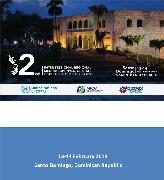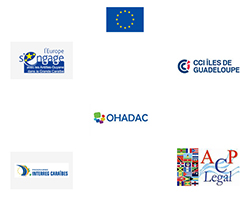UNCITRAL Conference on 13 and 14 February in Santo Domingo, Dominican Republic, on Investor-State Dispute Settlement Reform
Publié le 28/02/2019, 12h33
 The OHADAC team was invited at the Second Inter-Sessional Regional Meeting held in Santo Domingo on 13 and 14 February 2019, in the context of the UNCITRAL Working Group on Investor-State Dispute Settlement Reform (see the program here).
The OHADAC team was invited at the Second Inter-Sessional Regional Meeting held in Santo Domingo on 13 and 14 February 2019, in the context of the UNCITRAL Working Group on Investor-State Dispute Settlement Reform (see the program here).
UNCITRAL has been following the work of OHADAC for several years. Representatives of UNCITRAL had already pointed out at the 2015 Pointe-à-Pitre Congress the importance of legal harmonization work at a regional level, which was carried out during the first phase of the project thanks to the help of Europe and the Interreg funds obtained.
This event brought together representatives of UNCITRAL Member States, including a significant number of Caribbean States, such as Belize, Venezuela, Colombia, Jamaica, Costa Rica, Bahamas, Mexico, Ecuador and the Dominican Republic. Representatives of the regional organizations SELA and CARICOM were also present at this event as well as Investment Arbitration law experts from around the world.
These two days provided the States' representatives with an opportunity to express their views on the challenges being faced in the field of Investment Arbitration, which allows for the settlement of disputes between investors and States on the basis of texts protecting foreign investments. An important source of the international protection of foreign investments lies in bilateral investment treaties, known as BITs. These treaties guarantee certain protections to the investor, the main standards being the prohibition of expropriation; discrimination; unfair and inequitable treatment; and denial of justice. The State is always Respondent in the context of these proceedings, the possibilities of introducing counterclaims being very limited.
 The resolution of disputes in this area is subject to controversies, and certain shortcomings of the existing framework of Investment arbitration have been highlighted:
The resolution of disputes in this area is subject to controversies, and certain shortcomings of the existing framework of Investment arbitration have been highlighted:
- The main criticisms addressed to the framework of investment arbitration as it stands today relate to the cost and length of the proceedings; the lack of an expeditious procedure allowing prompt termination of claims against States that are manifestly abusive or that lacks serious grounds; the insufficient diversity of the arbitrators' panels; but also the lack of coherence between the decisions rendered which is a factor of uncertainty.
- State representatives were able to discuss the content of “new generation” investment treaties more protective of their interests, as well as solutions developed internally to overcome some of the shortcomings of the current system.
- Finally, these two days of meetings were also the opportunity for brainstorming and the formulation of new proposals.
OHADAC representatives were able to intervene and highlight the relevance of harmonization work in this context. The law of foreign investment protection stems from very different sources in the Caribbean, and standards of protection are very unequal. In addition, the content of these standards of investment protection are not always precisely defined. In this field, a work of codification would be welcome, encompassing a clarification of the sources of foreign investment protection in the Caribbean and the different levels of foreign investment protection by country. A model treaty of investment protection would also be proposed, providing States and investors with sufficient guarantees on both procedural and substantive levels.
It was mentioned that OHADAC could start work in this direction, and set up a working group bringing together experts and a number of Caribbean States' representatives who have already expressed interest in the initiative. For more information, Marie-Camille PITTON can be contacted at the following address: marie_camille_pitton@yahoo.fr
Imprimer